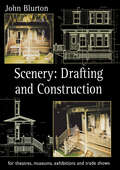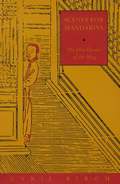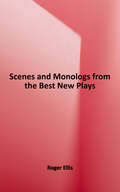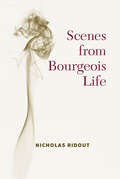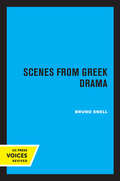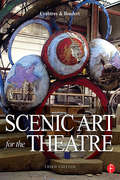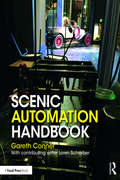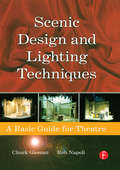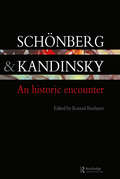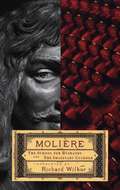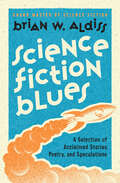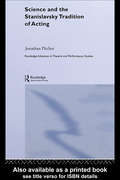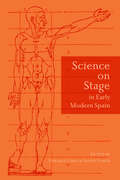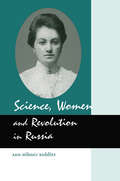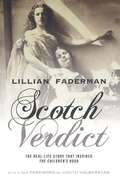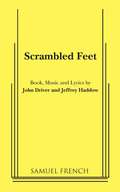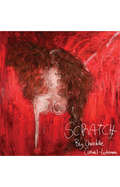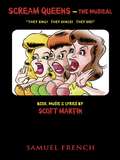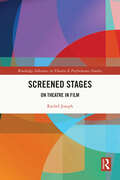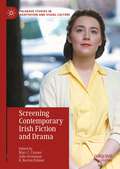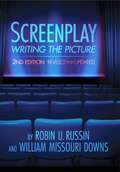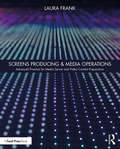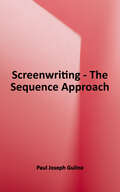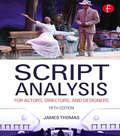- Table View
- List View
Scenery: Draughting and Construction for Theatres, Museums, Exhibitions and Trade Shows
by John BlurtonThis practical book looks at the types of drawing used, equipment, materials commonly specified, surveying, and also covers building floors, flats, cloths, windows, doors, trucks, staircases, roofs, revolves, multi-story structures, and bridges. By addressing both theater and the commercial world this book will be of real help to a broad range of people in the theater industry.
Scenes For Mandarins: The Elite Theater Of The Ming (Translations From The Asian Classics)
by Cyril BirchMing drama represents the classical Chinese theater at its most mature and exquisite. Between 1368 and 1644, more than four hundred playwrights produced over l,500 plays, ranging from one-act skits to massive, operatic works with fifty scenes or more. As a performing art, Ming theater - with its polished singing, enchanting music, fantastic plotting, and intricate choreography - has never been surpassed. <p><p> In China, well-known Ming plays are common cultural reference points to this day, and favorite scenes still form staples of the classical repertoire. But although a handful of plays have been translated in their entirety, until now there has been no general critical introduction to the subject available to readers in English. <p> Scenes for Mandarins fills this need, surrounding translated highlights from six of the best-loved plays of the Ming period with lively, entertaining commentary on each play. The narrative of pioneer Ming scholar Cyril Birch provides the context necessary to help Western readers grasp the scope of a genre that spanned the great diversity of Chinese society - from the popular to the elite; from the poor, arid northern regions to the lush gentility of the south.
Scenes and Monologs from the Best New Plays: An Anthology of New Dramatic Writing from Professionally Produced American Plays
by Roger EllisThis book is a practical resource for acting and directing students of all ages middle through high school, college, and professionals young and old. Its 30 duet scenes and eight monologues include a fair sampling of the late 20th-century work of playwrights across the United States. These excerpts are highly original in that few people can claim to have read or seen them performed, though they have all been produced regionally. The gallery of characters contained in these pages offers readers an arresting and kaleidoscopic reflection of American society. The literary styles one encounters here demonstrate the range and power of American writers who will continue to shape theatrical techniques for years to come. Overall, this anthology provides a generous sampling of vital and compelling treatments of our social, artistic, and spiritual experiences of the late 20th century.
Scenes from Bourgeois Life (Theater: Theory/Text/Performance)
by Nicholas RidoutScenes from Bourgeois Life proposes that theatre spectatorship has made a significant contribution to the historical development of a distinctive bourgeois sensibility, characterized by the cultivation of distance. In Nicholas Ridout’s formulation, this distance is produced and maintained at two different scales. First is the distance of the colonial relation, not just in miles between Jamaica and London, but also the social, economic, and psychological distances involved in that relation. The second is the distance of spectatorship, not only of the modern theatregoer as consumer, but the larger and pervasive disposition to observe, comment, and sit in judgment, which becomes characteristic of the bourgeois relation to the rest of the world. This engagingly written study of history, class, and spectatorship offers compelling proof of “why theater matters,” and demonstrates the importance of examining the question historically.
Scenes from Greek Drama (Sather Classical Lectures #34)
by Bruno SnellThis title is part of UC Press's Voices Revived program, which commemorates University of California Press’s mission to seek out and cultivate the brightest minds and give them voice, reach, and impact. Drawing on a backlist dating to 1893, Voices Revived makes high-quality, peer-reviewed scholarship accessible once again using print-on-demand technology. This title was originally published in 1964.
Scenic Art for the Theatre: History, Tools and Techniques
by Susan Crabtree Peter BeudertNow in its Third Edition, Scenic Art for the Theatre: History, Tools and Techniques continues to be the most trusted source for both student and professional scenic artists. With new information on scenic design using Photoshop, Paint Shop Pro and other digital imaging softwares this test expands to offer the developing artist more step-by-step instuction and more practical techniques for work in the field. It goes beyond detailing job functions and discussing techniques to serve as a trouble-shooting guide for the scenic artist, providing practical advice for everyday solutions.
Scenic Automation Handbook
by Gareth ConnerScenic automation has earned a reputation of being complicated and cantankerous, a craft best left to the elite of our industry. Not sure of the difference between a VFD, PLC, or PID? If you have dreamed of choreographing scene changes with computerized machinery, but get lost in the technical jargon the Scenic Automation Handbook will guide you along the road to elegant automation. Adopting a pragmatic approach, this book breaks down any automation system into five points, known as the Pentagon of Power. Breaking down a dauntingly complex system into bite- size pieces makes it easy to understand how components function, connect, and communicate to form a complete system. Presenting the fundamental behaviors and functions of Machinery, Feedback Sensors, Amplifiers, Controls, and Operator Interfaces, the Scenic Automation Handbook demystifies automation, reinforcing each concept with practical examples that can be used for experimentation. Automation is accessible – come along and learn how!
Scenic Design and Lighting Techniques: A Basic Guide for Theatre
by Rob Napoli Chuck GlomanBasic. This is the key word in Scenic Design and Lighting Tecniques: A Basic Guide for Theatre, written by two seasoned professionals with over twenty years of experience. This book is designed to show you how to turn a bare stage into a basic set design, without using heavy language that would bog you down. From materials and construction to basic props and lighting, this book explains all you will need to know to build your set and light it.
Schonberg and Kandinsky: An Historic Encounter (Contemporary Music Studies)
by Konrad BoehmerFirst Published in 1998. Routledge is an imprint of Taylor & Francis, an informa company.
School for Husbands and The Imaginary Cuckold, or Sganarelle
by Richard Wilbur Jean Baptiste De Moliere"My notion of translation is that you try to bring it back alive. . . . If you take on a text which is somehow appropriate to you and which you may already love, what you want to do is to be as perfectly the slave of it as you can be."--Richard WilburOriginally inspired by a revelatory Comédie-Française production of The Misanthrope in 1948 Paris, Richard Wilbur has made translating Molière part of his lifework. These two comedies of marriage and misunderstanding are gathered here in a single volume that is part of TCG's new series (with design by Chip Kidd) to complete trade publication of these vital theatrical works.
Science Fiction Blues: A Selection of Acclaimed Stories, Poetry, and Speculations
by Brian W. AldissCollected from an evening of live performance, a selection of the Science Fiction Grand Master&’s best stories, poetry, and speculations. In October 1987, Brian W. Aldiss—with the help of two other performers—took his science fiction to the masses, staging theatrical performances of his best stories and fantastic, mind-wrenching speculations before a live audience. Included in Science Fiction Blues are three short stories that were included in the show&’s program, three scripted stories that didn&’t make the final cut, and a selection of the author&’s science fiction poetry. Among the scripted stories, readers will find &“Supertoys Last All Summer Long,&” based on the original short story that inspired Stanley Kubrick and Steven Spielberg&’s film A.I. Artificial Intelligence, in which Aldiss portrayed the role of Teddy. When the show was taken on the road, Matrix hailed it as &“possibly the best piece of SF theatre [they&’ve] seen.&” In this book&’s introduction, Robert Holdstock recalls it as &“an evening of splendidly visual effects&” all done by words that &“managed to indulge all the senses, all the moods. . . .The feeling was one of something very special.&”
Science and the Stanislavsky Tradition of Acting (Routledge Advances in Theatre & Performance Studies #Vol. 3)
by Jonathan PitchesProviding new insight into the well-known tradition of acting, Science and the Stanislavsky Tradition of Acting is the first book to contextualise the Stanislavsky tradition with reference to parallel developments in science. Rooted in practice, it presents an alternative perspective based on philosophy, physics, romantic science and theories of industrial management. Working from historical and archive material, as well as practical sources, Jonathan Pitches traces an evolutionary journey of actor training from the roots of the Russian tradition, Konstantin Stanislavsky, to the contemporary Muscovite director, Anatoly Vasiliev. The book explores two key developments that emerge from Stanislavsky’s system – one linear, rational and empirical, while the other is fluid,organic and intuitive. The otherwise highly contrasting acting theories of Vsevolod Meyerhold (biomechanics) and Lee Strasberg (the Method) are dealt with under the banner of the rational or Newtonian paradigm; Michael Chekov’s acting technique and the little known ideas of Anatoly Vasiliev form the centrepiece of the other Romantic, organic strain of practice. Science and the Stanislavsky Tradition of Acting opens up the theatre laboratories of five major practitioners in the twentieth and twenty-first centuries and scrutinises their acting methodologies from a scientific perspective.
Science on Stage in Early Modern Spain (Toronto Iberic)
by Enrique Garcia Santo-TomasScience on Stage in Early Modern Spain features essays by leading scholars in the fields of literary studies and the history of science, exploring the relationship between technical innovations and theatrical events that incorporated scientific content into dramatic productions. Focusing on Spanish dramas between 1500 and 1700, through the birth and development of its playhouses and coliseums and the phenomenal success of its major writers, this collection addresses a unique phenomenon through the most popular, versatile, and generous medium of the time. The contributors tackle subjects and disciplines as diverse as alchemy, optics, astronomy, acoustics, geometry, mechanics, and mathematics to reveal how theatre could be used to deploy scientific knowledge. While Science on Stage contributes to cultural and performance studies it also engages with issues of censorship, the effect of the Spanish Inquisition on the circulation of ideas, and the influence of the Eastern traditions in Spain.
Science, Women and Revolution in Russia
by KoblitzWhile the women's movement might seem like a relatively new concept, Russian women of the 1860s deserve to be acknowledged as individuals who changed the direction of science and opened the doors of higher education to women throughout Europe. The 1860's and 1870's witnessed a rise in women's consciousness and the beginnings of the Russian revolutionary movement that saw women pursue and receive doctorates in many areas of science. These same women went on to become some of the brightest in their fields. This book provides a look at Russian women scientists of the 1860's, their personal independence, and technical and literary achievements that made science the popular social movement of the time and changed the face of the Russian intellectual culture.
Scotch Verdict: The Real-Life Story That Inspired "The Children's Hour"
by Lillian FadermanIn 1810, a Scottish student named Jane Cumming accused her school mistresses, Jane Pirie and Marianne Woods, of having an affair in the presence of their students. Dame Helen Cumming Gordon, the wealthy and powerful grandmother of the accusing student, advised her friends to remove their daughters from the Drumsheugh boarding school. Within days, the institution was deserted and the two women were deprived of their livelihoods.Award-winning author Lillian Faderman recreates the events surrounding this notorious case, which became the basis for Lillian Hellman's famous play, The Children's Hour. Reconstructing the libel suit filed by Pirie and Woods—which resulted in a scotch verdict, or a verdict of inconclusive/not proven—Faderman builds a compelling narrative from court transcripts, judges' notes, witnesses' contradictory testimony, and the prejudices of the men presiding over the case. Her fascinating portrait documents the social, economic, and sexual pressures shaping the lives of nineteenth-century women and the issues of class and gender contributing to their marginalization.
Scrambled Feet
by John DriverMusical Revue / 3m, 1f, 1 duck / This intimate musical revue is a zany, hilarious spoof dedicated to satirizing every conceivable aspect of show business. Among the many skits are a pointed parody of theater party ladies, a wrestling match between "The Elephant Man" and the paraplegic hero of "Whose Life Is It Anyway?", the traumas of a suburban couple getting to and going from the theatre, a madrigal on the popularity of British plays and performers, takeoffs on critics and on Joseph Papp and his Public Theatre. It's a perfect show for anyone involved with the theater.
Scratch
by Charlotte Corbeil-ColemanWhen fifteen-year-old Anna is told that her mother is dying of cancer, she responds in the only way she knows how—by ignoring the issue. Friends and family are unable to understand her reaction and Anna is increasingly frustrated by their attempts to help her, escalated of course by her persistent itching. Told by Anna with assistance from her best friend, father, aunt, and her dying mother, Scratch is a fresh, funny, and realistic play about the urgency of life and the need to live it to the fullest extent.
Scream Queens - The Musical
by Scott MartinMusical Comedy / 6f (ages 28 - 50+) "They sing -- they dance -- they die!" A hotel ballroom, 1998, and six voluptuous B-movie "Scream Queens" revive their fading acting careers by presenting a musical revue for their fans at a science fiction and horror film convention. From young newbie to seasoned grand dame, the Queens strut their stuff in song and dance to prove "I Got All of the Talent I Need." For 90 minutes of hilarious musical mayhem, they take the audience into the world of no-budget movies with awful scripts, fake monsters and gooey "Special FX." They even involve the audience in a screaming contest and zombie talent search. As each Queen reveals her personal story, we share their hopes and dreams, from Tonya's love of her idol "Fay Wray" to Alexis' advice that "Everybody Starts at the Bottom" to DeeDee's secrets of Scream Queen longevity: "Don't Open That Door." British screen veteran Nadine savors her joy of being "Still In Demand" while Bianca celebrates the lifetime achievements of "Roger Corman" and Richelle laments her own elusive "Happy Endings." They also screen original clips from their direct-to-video "scary movie" spoofs such as "Revenge of the Psycho Bimbos" and "Malibu Vampire Vixens," all hoping to attract the attention of a popular young horror film director lurking in the audience. The Scream Queens will have you convulsed with laughter and begging for the inevitable sequel. "A sassy musical revue; an affectionate funny tribute...with something for everyone." -Los Angeles Times "Campy and full of shtick, affection and great fun!" -The Hollywood Reporter "It's a riot!" -Los Angeles Jewish Times
Screened Stages: On Theatre in Film (ISSN)
by Rachel JosephThis book is devoted to tracing the variety of ways that theatre, theatricality, and performance are embedded in Hollywood cinema as screened stages.A screened stage is the literal or metaphorical appearance of a stage on screen. When the Hollywood style emerged in cinema history it traumatically severed the entwined relationship between film and theatre. The book makes the argument that cinema longs for theatre after that separation. The histories of stage and screen persistently crisscross one another making their separation problematic. The screened stage from the end of the nineteenth century until now offers a miniaturized version of cinema and theatre history. Moments of the stage within the screen compress historical styles and movements into saturated representations on film. Such examples overflow the cinematic screen into singular manifestations of presentness. Screened stages uncover what it means to be simultaneously present and absent.This book would be of great interest to students and scholars of theatre, film, dance, and performance.
Screening Contemporary Irish Fiction and Drama (Palgrave Studies in Adaptation and Visual Culture)
by R. Barton Palmer Marc C. Conner Julie GrossmanIn this book, each chapter explores significant Irish texts in their literary, cultural, and historical contexts. With an introduction that establishes the multiple critical contexts for Irish cinema, literature, and their adaptive textual worlds, the volume addresses some of the most popular and important late 20th-Century and 21st Century works that have had an impact on the Irish and global cinema and literary landscape. A remarkable series of acclaimed and profitable domestic productions during the past three decades has accompanied, while chronicling, Ireland’s struggle with self-identity, national consciousness, and cultural expression, such that the story of contemporary Irish cinema is in many ways the story of the young nation’s growth pains and travails. Whereas Irish literature had long stood as the nation’s foremost artistic achievement, it is not too much to say that film now rivals literature as Ireland’s key form of cultural expression. The proliferation of successful screen versionings of Irish fiction and drama shows how intimately the contemporary Irish cinema is tied to the project of both understanding and complicating (even denying) a national identity that has undergone radical change during the past three decades. This present volume is the first to present a collective accounting of that productive synergy, which has seen so much of contemporary Irish literature transferred to the screen.
Screening Early Modern Drama
by Pascale AebischerWhile film adaptations of Shakespeare's plays captured the popular imagination at the turn of the last century, independent filmmakers began to adapt the plays of Shakespeare's contemporaries. The roots of their films in European avant-garde cinema and the plays' politically subversive, sexually transgressive and violent subject matter challenge Shakespeare's cultural dominance and the conventions of mainstream cinema. In Screening Early Modern Drama, Pascale Aebischer shows how director Derek Jarman constructed an alternative, dissident, approach to filming literary heritage in his 'queer' Caravaggio and Edward II, providing models for subsequent filmmakers such as Mike Figgis, Peter Greenaway, Alex Cox and Sarah Harding. Aebischer explains how the advent of digital video has led to an explosion in low-budget screen versions of early modern drama. The only comprehensive analysis of early modern drama on screen to date, this groundbreaking study also includes an extensive annotated filmography listing forty-eight surviving adaptations.
Screenplay: Writing The Picture
by Robin U. Russin William M. DownsScreenplay is a complete screenwriting coursefrom initial idea through final script saleproviding in-depth discussions of theme development; story research; script plotting and structuring; character development; dialogue; writing and rewriting methods; formatting; the ins and outs of marketing and pitching scripts; writing for TV, the Web and video games, and much more. Well-written, comprehensive and filled with both innovative and tried-and-true writing techniques, illustrative screenplay examples and sage advice from veteran writers, Screenplay will help novices as well as working screenwriters improve and sell their scripts. The second edition of this popular manual is completely revised, reflecting current film industry practices, and includes new chapters on such subjects as Webisodes and video games, as well as updates to its many examples.
Screens Producing & Media Operations: Advanced Practice for Media Server and Video Content Preparation
by Laura FrankMedia servers have established themselves as the dominant video playback tool for live events; however, the practice of delivering content to these systems and the structure of the media operations team is still evolving. This book outlines a workflow for video content delivery and describes team communication that can be applied to any entertainment production including: television specials, concert touring, corporate events, theater, as well as special events, film, large audience marketing events, and multi-screen permanent installations. This workflow is hardware and software independent, designed to evolve with future technologies as they become established in the field of multi-screen production, and has been proven professionally by the author and her peers over a decade of productions. The methodology presented will provide insights beneficial to students and current practitioners of media server technology, screens producers, and video content developers. Using real world examples of internationally recognized productions, a foundation is laid for best practices in Media Operations. Additional content, including full-color versions of the images inside the book, is available online.
Screenwriting: The Sequence Approach
by Paul Joseph GulinoThe great challenge in writing a feature-length screenplay is sustaining audience involvement from pages one through 120. This book expounds on an often-overlooked tool that can be key in solving this problem. A screenplay can be understood as being built of sequences of about fifteen pages each, and by focusing on solving the dramatic aspects of each of these sequences in detail, a writer can more easily conquer the challenges posed by the script as a whole. <p><p>The sequence approach has its foundation in early Hollywood cinema (until the 1950s, most screenplays were formatted with sequences explicitly identified), and has been rediscovered and used effectively at such film schools as the University of Southern California, Columbia University and Chapman University. This book exposes a wide audience to the approach for the first time, introducing the concept and then providing a sequence analysis of eleven significant feature films made between 1940 and 2000.
Script Analysis for Actors, Directors, and Designers
by James ThomasScript Analysis for Actors, Directors, and Designers teaches the skills of script analysis using a formalist approach that examines the written part of a play to gauge how the play should be performed and designed. Treatments of both classic and unconventional plays are combined with clear examples, end-of-chapter questions, and stimulating summaries that will allow actors, directors and designers to immediately incorporate the concepts and processes into their theatre production work. Now thoroughly revised, the fifth edition contains a new section on postmodernism and postdramatic methods of script analysis, along with additional material for designers.
